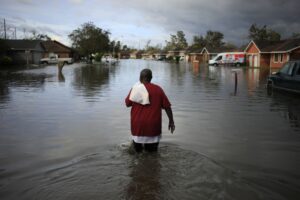“It’s not just the big monster ones, it’s a whole season,” Wehner said.


Climate change made the 2020 Atlantic hurricane season noticeably wetter, and it will likely make this season rainier, too, scientists said.
Human-caused climate change made the entire season drop about 5% more rain. During the 14 storms that reached hurricane status the rainfall was 8% heavier, according to the study in Nature Communications, a research journal.
“It doesn’t sound like a lot, but if you’re near a threshold, a little bit can push you over the top,” said Lawrence Berkeley National Lab climate scientist Michael Wehner, co-author of the paper, according to the Associated Press and other news reports. “The implication is that that means there was more freshwater flooding and that the damages from freshwater flooding were increased, but by how much would require a more detailed analysis.”
Past studies have predicted climate change would make storms wetter and found that storms, such as 2017’s Harvey, were, in fact, wetter because of human-caused climate change. But this is the first study to look at an entire season, Wehner said. That’s important because it removes the selection bias of just picking the worst storms, such as Harvey.
“It’s not just the big monster ones, it’s a whole season,” Wehner said.
Warming is increasing the downpours in nearly all storms and most hurricane seasons, including the one that starts June 1, said study lead author Kevin Reed, an atmospheric scientist at Stony Brook University.

The 2020 season may be the harbinger of years to come. It broke records for the number of named storms, and for the number that became major storms with winds of at least 111 miles per hour – seven – and the number that made landfall in the United States. Louisiana got hit five times. Overall, more than 330 people were killed directly by named storms in 2020 and damage soared past $41 billion, according to the U.S. National Oceanic and Atmospheric Administration.
“That signal will only get larger as the sea surface temperatures continue to warm,” Reed said.